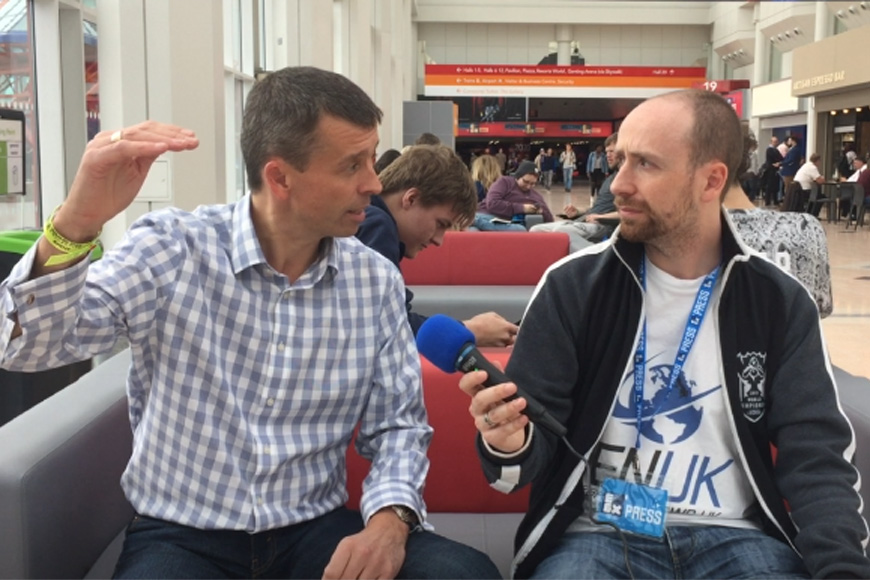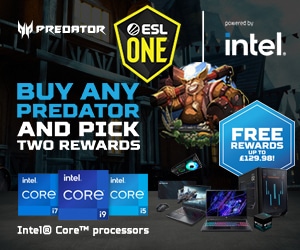Following Intel’s announcement of an esports VR Challenger League earlier this year, we sit down with Intel’s EMEA sales director Steve Shakespeare at EGX to discuss new technologies, what the company is doing in esports and how to make sure your PC is fit for competitive gaming.
ENUK: What is Intel doing at EGX this year?
Steve Shakespeare, Intel: We’re here to talk about how we’re helping gamers have a great experience when they’re playing the games and enabling esport activities. We’re here to really talk about all the latest tech coming from at Intel for the gaming enthusiasts out there, and how we’re working with the hardware manufacturers to bring that to life in gaming systems.
What should gamers be aware of over the next few years if they’re upgrading their PC? You have some new processors on the way…
Yeah we have and we’re really excited about it. What I love about this industry is it’s so tech hungry. Everybody wants to take that and have the best gaming experience they can.
A couple of months ago we launched our very latest super high-end gaming platform called Core i9. And that takes you right the way up to 18 cores – that’s 36 threads of computing power, enabling you to have what we call mega-tasking! That’s the ability to play games, record games, stream games on Twitch, share with your friends, communicate – you can do all that on a platform. That’s right at the high-end so it’s quite expensive stuff but for the super high-end experts it’s a great platform.
At the same time, we’ve just announced our 8th generation Core. Everyone’s familiar with Core i3, Core i5, Core i7… good, better, best in terms of the best PC platforms out there. We’ve just announced Core i5 and Core 7 8th gen for notebooks, so that’s available now. That gives you up to 40% more computing power, meaning you can have 40% more performance for all the games you want to play. That comes on notebooks first and we’ll be announcing similar products on desktop and for big gaming notebooks. We’re really excited about that.
For those who don’t understand how Intel works with the industry, please explain.
We work with the whole industry. We work with all the major hardware manufacturers and also the smaller local guys. What’s important about that is we work with them so they can understand how to take advantage of these latest chips, because we make the chips and the chipsets that power it, but they have to bring it all together. So we work with them to bring the best platforms to market.
We try to simplify that with our branding. The very best is Core i9 which is an expensive, high-end but smaller market. Core i7 is the best mainstream product, then Core i5 then Core i3. If you’re on a budget, we’ve got Pentium or Celeron systems. So that’s the stack of processors, I encourage people to look at that.
Obviously you’re an enthusiast gamer, you want to have a great graphics capability. So depending on your budget and your needs, we have integrated Intel HD graphics for mainstream gaming. But if you want the best, then you want discrete graphics, and we work with the discrete graphics vendors so that you can get the best of both worlds. Have a balanced system with a high-performance CPU (processor) and a great graphics card, that’s what’s going to give the best gaming experience.
“I think we’ll increasingly start to see more and more VR gaming coming to esports as people want to immerse themselves with that.”
Virtual reality is still a hot topic, and VR is being explored in esports too. What are your views on the technology?
We’re still starting the journey on VR. It’s really, really exciting. You come here to EGX and walk around, there’s a load of games being played here on VR, you look out there in terms of the innovation and there’s stacks of stuff going on.
We think there’s at least 2,000 VR games available for streaming today. So we’re enabling that. To have a great VR experience you need to have it smooth, right, so when you have the headset on, you don’t want it to stutter, otherwise it can make you feel sick or ill. So you need a great graphics card and great CPU.
So if you want the best framerate for VR, you need a Core i7 with a good graphics card to do that. And typically we think 90hz or 90fps is what gives you smooth gameplay. So the rule of thumb – Core i7 will give you that. With some games you get it with Core i5, if you start to go lower than that and it’s a bit unsure.
Here at EGX we’ve got things like Archangel on VR. So I’m really excited about it, I think we’re right at the start of the journey here and it’s coming to the mainstream.
And it’s coming to esports as well, so I think we’ll increasingly start to see more and more VR gaming coming to esports as people want to immerse themselves with that. We’re committed to bringing new technology to bring that to life, for a great experience.
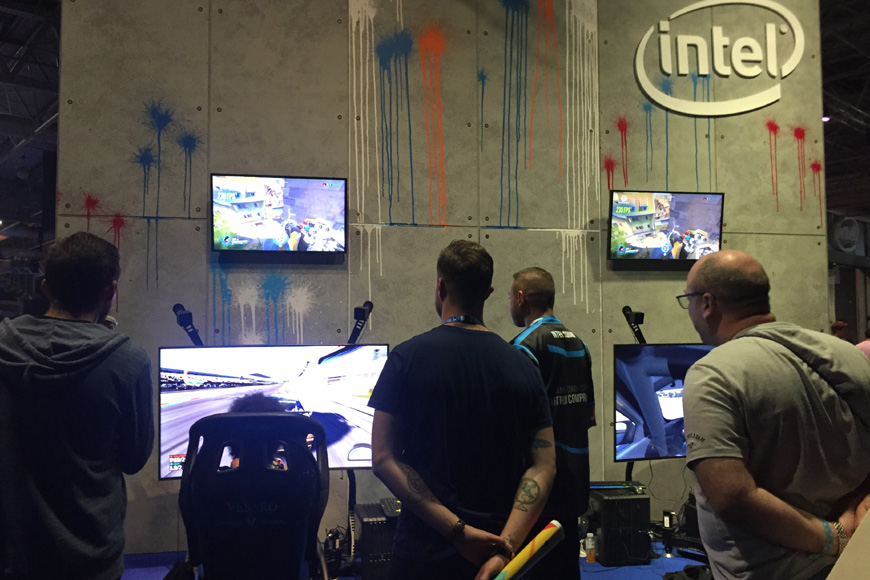
On that note, what are your views on VR in esports as a viable piece of technology. Esports is historically keyboard and mouse, or controllers on console. Do you think VR will really work in esports, will pro gamers use VR, or will it be used by players at home competitively?
It’s becoming more and more accessible for everybody. I think it brings a different dimension, I think the classic [keyboard/mouse/controller] approach for computer gaming is not going to go away, I think it will be added to with VR. It will have another dimension.
I think you’re going to see VR esports game leagues and activity. Many people play games and stream it on Twitch – you’ll be able to do the same thing with VR. But to do that, not only do you need to catch what’s on the screen, you need to put the player into the image and stream that. That requires even more compute capability, but we’ll be able to do that and broadcast it. So you’ll be able to watch VR head-to-head esports games through Twitch, because we’ll be able to convey the whole image of what the player is seeing in their headset as part of that game.
We showed a demonstration at IFA in Berlin the other week. We had a Core i9 18-core system there, it was amazing – we had a pro gamer playing a VR game and it was recording that VR game, then rendering his image into the VR game and broadcasting it on the internet. It was fantastic. So I think it’s incredibly exciting. Again it’s early days but it’s going to come.
Is it going to replace CSGO, StarCraft or League of Legends? I don’t think so. I think it’s going to add to that and make the whole esports activity even more exciting.
“There are some teams around the world that we work with and that’s a focused activity for us, but I think the bigger picture is supporting the industry, and working with the hardware manufacturers.”
Intel has worked in the esports space for quite some time now, sponsoring teams and holding the Intel Extreme Masters events every year. What is Intel’s views on esports and where do you see it going?
Esports is a big deal for us and you’re right, we’ve worked with it for years and working with the Intel Extreme Masters event for years, which culminates in the finals in Katowice, Poland. I was there for that this year, we had 170,000 people there in the arena to watch this game and it was like a football game. You had the crowd going, lots of cheering and the whole emotion behind it was brilliant, and we love that.
We want to develop and bring the best technology we can to the market to enable gamers and esports players to do their very best, enjoy it and for it to be a sport everyone can engage in and enjoy.
We’re committed to that, to working with ESL at the Intel Extreme Masters event, and we’re working with events such as EGX here. We’ve got esports events and competitions happening here. I think it’s really cool and we’re going to keep doing it.
It’s a wonderful industry and I think it’s bringing a whole new dimension to computing.
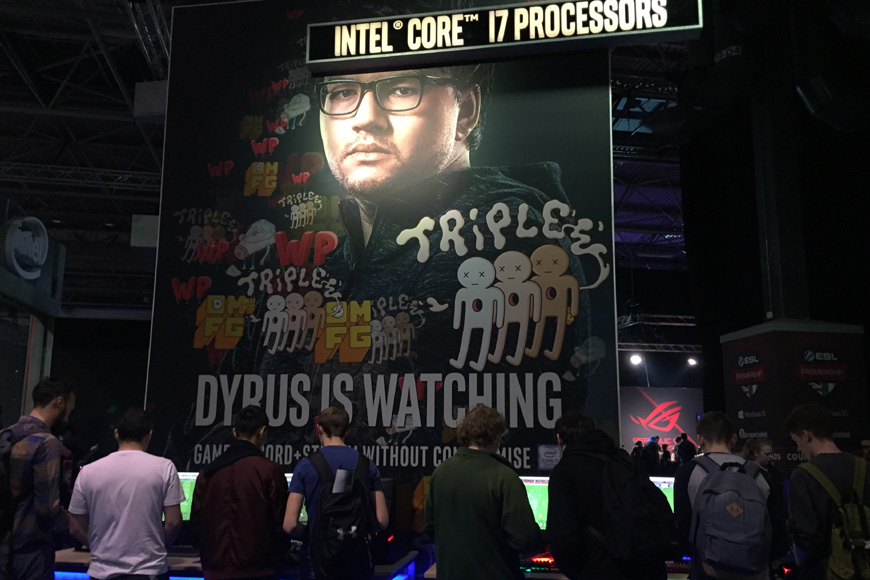
Is Intel supporting and sponsoring some of the grassroots UK esports teams or aiming at bigger global teams?
We’re investing in prize money, in events and we’re encouraging teams to come into that and participate and join it. Our approach is really to support the industry at large and bring that to life, because we want it to be accessible to everybody.
We want to bring it to life here [at EGX]. We’ve got our stand and our event here. We’re inviting people to come in and play and experience the games. That’s the approach we’re taking on that. Our sponsorship is more around the gaming event per se.
There are some teams around the world that we work with and that’s a focused activity for us, but I think the bigger picture is supporting the industry, and working with the hardware manufacturers. So you’ll see all of the hardware manufacturers here with platforms that support great gaming experiences.
We want to help the whole industry grow and develop.
“We’ve got systems at every price to support every budget and to support your aspirations. I think that’s really important – esports is an experience for everyone and we have a solution that most people’s wallets can afford.”
Is there anything else you’d like to add?
Yeah, I haven’t talked about software vendors. We’re working with them, and it’s important that software is designed so it can take advantage of the platform.
We touched on VR a little bit, when you look at VR there’s a couple of elements to it. There’s what’s called the physics engine which is calculating what happens. So when a car blows up in a game, when you look at that and see the bits of metal spraying around the screen and hitting other objects, you have to have the physics engine that calculates what goes where. That all gets done by the CPU, so that’s why the Intel processor is really important.
We also do the processing on artificial intelligence (AI), what logic is out there and the sound distribution. You’ve got to pair that with a great graphics card which renders it and draws it on the screen. So the sum of the two is important. Have a great graphics card, have a great CPU and then you’re going to have a great gaming experience. And that’s something we’re going to keep doing.
When are the new 8th gen core processors out?
They are shipping now. It’s a family. The Core X family of processors, there’s a Core i5 X series right up to Core i9 X series.
The 10-core product is shipping now, the 18-core product is shipping this month (October) and this is accessible for Christmas. For those of you who want to look at it, please talk to your favourite PC gaming supplier, online or in-store, and talk to them about what they have. I’m aware that there are products coming from many of the hardware manufacturers into that space.
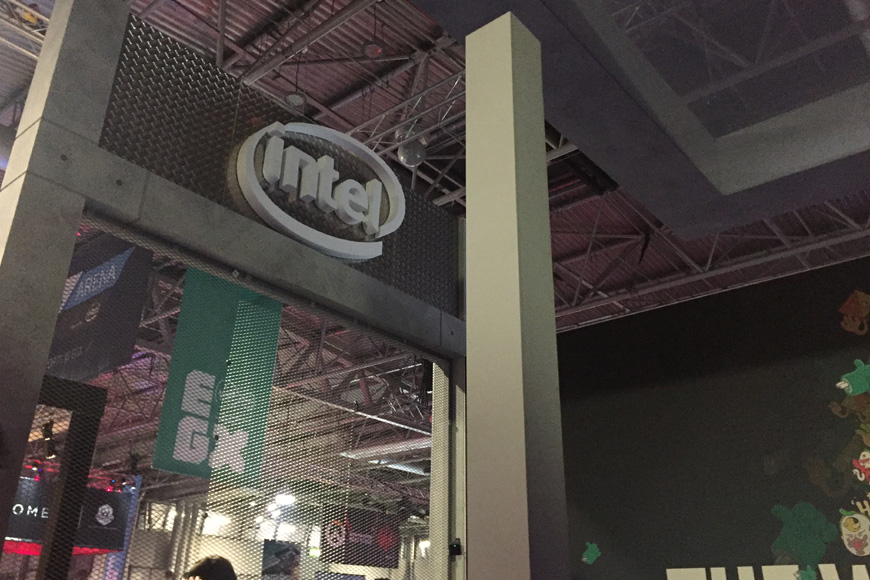
What kind of pricing can we expect?
It’s best to talk to the OEMs (Original Equipment Manufacturers) to get their prices. The price is the decision of the hardware manufacturer – it goes from hundreds of pounds up to several thousand pounds and it depends on what you want.
We’ve got systems at every price to support every budget and to support your aspirations. I think that’s really important – esports is an experience for everyone and we have a solution that most people’s wallets can afford. If you have the budget and the aspiration, you can get some super high-end products.
If you’ve got a more reasonable investment, then there’s a solution for you as well. And that’s what we want to support, to get people into this and enjoy what technology can do for them.
Travel to EGX and accommodation was provided by Intel

Dom is an award-winning writer and finalist of the Esports Journalist of the Year 2023 award. He graduated from Bournemouth University with a 2:1 degree in Multi-Media Journalism in 2007.
As a long-time gamer having first picked up the NES controller in the late ’80s, he has written for a range of publications including GamesTM, Nintendo Official Magazine, industry publication MCV and others. He worked as head of content for the British Esports Federation up until February 2021, when he stepped back to work full-time on Esports News UK and offer esports consultancy and freelance services. Note: Dom still produces the British Esports newsletter on a freelance basis, so our coverage of British Esports is always kept simple – usually just covering the occasional press release – because of this conflict of interest.

